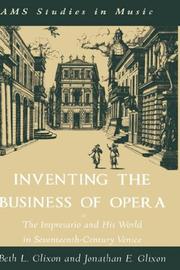| Listing 1 - 8 of 8 |
Sort by
|
Book
ISBN: 2871060444 9782871060444 Year: 1992 Publisher: Bruxelles Le Cri
Abstract | Keywords | Export | Availability | Bookmark
 Loading...
Loading...Choose an application
- Reference Manager
- EndNote
- RefWorks (Direct export to RefWorks)
78.77.8 --- Mortier, Gerard, --- 960 --- théâtre --- opéra --- levensbeschrijvingen --- biographies et mémoires --- Mortier, Gerard, - 1943-2014
Book
ISBN: 9782503602899 2503602894 Year: 2022 Publisher: Turnhout: Brepols,
Abstract | Keywords | Export | Availability | Bookmark
 Loading...
Loading...Choose an application
- Reference Manager
- EndNote
- RefWorks (Direct export to RefWorks)
The way in which music was financed from the 18th to the early 20th centuries has usually been depicted as a slow transition from private investment (or patronage) to more public forms of financial support. In particular, the later 18th and earlier 19th centuries marked fundamental changes in European life with the development of new technologies and expanding market economies. Composers and musicians, no longer bound by service to a court or a patron, were fully integrated into the musical market, and new categories emerged, such as theatre impresarios and the artistic agent. During the second half of the 19th century, the concept of a career as a concert musician began to take shape concurrently with the second Industrial Revolution. This book investigates the various aspects of financing the music world — in court, on lyrical stages, for concerts, or even music schools — and ask the question: did the provenance of funding and the funder’s identity have an impact on music itself?
Music --- Music trade --- Finance --- Economic aspects --- Social aspects --- 78.77.8 --- 78.87.1

ISBN: 3714171045 Year: 1979 Publisher: Wien München Jugend & Volk
Abstract | Keywords | Export | Availability | Bookmark
 Loading...
Loading...Choose an application
- Reference Manager
- EndNote
- RefWorks (Direct export to RefWorks)
CDL --- 782 --- Mahler, Gustav, --- Wiener Staatsoper. --- 78.77.8 --- Mahler, Gustav. --- Mahler, Gustav --- Maler, Gustav, --- Maler, G. --- Mārā, Gusutafu,
Book
ISBN: 9788493507046 Year: 2008 Volume: 1 Publisher: Granada Publicaciones del archivo Manuel de falla
Abstract | Keywords | Export | Availability | Bookmark
 Loading...
Loading...Choose an application
- Reference Manager
- EndNote
- RefWorks (Direct export to RefWorks)
Composers --- Compositeurs --- Economic conditions --- Biography --- Conditions économiques --- Biographies --- Falla, Manuel de, --- 78.21.1 FALL 2008 --- 78.77.8
Book
ISBN: 9072411854 Year: 1991 Publisher: Zellik Roularta Books
Abstract | Keywords | Export | Availability | Bookmark
 Loading...
Loading...Choose an application
- Reference Manager
- EndNote
- RefWorks (Direct export to RefWorks)
75 p. : ill.
Mortier, Gerard --- 78.77.8 --- Opera producers and directors --- Opera --- 792.54 <493> MONNAIE --- 929 MORTIER, GERARD --- cultuur --- kunst --- management --- Directors, Opera --- Opera directors and producers --- Producers, Opera --- Persons --- Opera direction --- Opera production --- Operas --- Biography --- Production and direction --- Direction --- Mortier, Gerard. --- Opera's --- Geschiedenis --- België --- Geneeskunde --- Techniek (wetenschap) --- Atlas --- Museum

ISBN: 9780195154160 0195154169 0199868484 1429461845 1280965703 0195348362 9786610965700 0195342976 9780195342970 Year: 2006 Volume: *1 Publisher: Oxford Oxford University Press
Abstract | Keywords | Export | Availability | Bookmark
 Loading...
Loading...Choose an application
- Reference Manager
- EndNote
- RefWorks (Direct export to RefWorks)
In mid-seventeenth-century Venice, opera first emerged from courts and private drawing rooms to become a form of public entertainment. Early commercial operas were elaborate spectacles, featuring ornate costumes and set design along with dancing and music. As ambitious works of theater, these productions required not only significant financial backing, but also strong managers to oversee several months of rehearsals and performances. These impresarios were responsible for every facet of production from contracting the cast to balancing the books at season's end. The systems they created still survive, in part, today. Inventing the Business of Opera explores public opera in its infancy, from 1637 to 1677, when theater owners and impresarios established Venice as the operatic capital of Europe. Drawing on extensive new documentation, the book studies all of the components necessary to opera production, from the financial backing and the issue of patronage to the commissioning and creation of the libretto and the score; the recruitment and employment of singers, dancers, and instrumentalists; the production of the scenery and the costumes; and the nature of the audience. The authors examine the challenges faced by four separate Venetian theaters during the seventeenth century, and focus particularly on the progress of Marco Faustini, the impresario most well known today. Faustini made his way from one of Venice's smallest theaters to one of the largest, and his advancement provides a personal view of an impresario and his partners, who ranged from Venetian nobles to artisans. Throughout the book, Venice emerges as a city that prized novelty over economy, with new repertory, scenery, costumes, and expensive singers the rule rather than the exception. Through close examination of an extraordinary cache of documents--including personal papers, account books, and correspondence--Beth and Jonathan Glixon provide a comprehensive view of opera production in mid seventeenth
Theatre management --- Music --- anno 1600-1699 --- Venice --- Opera --- Production and direction --- History --- Italy --- Venice (Italy) --- 17th century --- 78.21.2 Venice --- 78.77.0 --- 78.77.8 --- Opéra --- Production et mise en scène --- Histoire --- Opera's --- Italië --- 17e eeuw
Book
Abstract | Keywords | Export | Availability | Bookmark
 Loading...
Loading...Choose an application
- Reference Manager
- EndNote
- RefWorks (Direct export to RefWorks)
English language --- Music trade --- Muziek --- Muziekindustrie --- Dutch --- Woordenboeken. --- Music --- Mass communications --- Belgium --- Handbooks, manuals, etc. --- Sound recording industry --- Dictionaries --- 78.77.8 --- 78.03 --- Woordenboeken --- Cultuur --- Industrie --- Vaktaal --- Academic collection --- #SBIB:309H140 --- #SBIB:309H01 --- muziek --- Populaire muziek: algemene werken --- Communicatiewetenschap: encyclopedieën, woordenboeken, naslagwerken, bibliografieën --- Woordenboek --- Vakjargon --- Toerisme --- Voorlichting --- Reclame --- Spionage --- Communicatietheorie
Book
ISBN: 9782246824251 2246824257 Year: 2022 Publisher: 72-La Flèche: Paris: Impr. CPI Brodard & Taupin, Bernard Grasset,
Abstract | Keywords | Export | Availability | Bookmark
 Loading...
Loading...Choose an application
- Reference Manager
- EndNote
- RefWorks (Direct export to RefWorks)
Peu de femmes ont à ce point excité les passions, poussé aux commentaires les plus contradictoires, suscité autant de biographies. Marie-Antoinette n'est pas une reine comme les autres et l'on tend à la redécouvrir aujourd'hui sous des aspects moins connus. Le présent ouvrage se penche pour la première fois sur les liens forts qu'elle a entretenus avec la musique : ses études à Vienne, sa découverte du monde musical français, sa passion pour la harpe, le pianoforte et le chant, mais aussi pour l'opéra et l'opéra-comique. Par son soutien sans faille aux spectacles de la cour ou de Paris, elle a marqué sa volonté d'internationaliser un répertoire jusque-là très franco-centré.Au fil des pages, depuis son arrivée à l'âge de 14 ans jusqu'aux jours sombres des Tuileries, on découvre le rôle important qu'elle a joué dans la société culturelle de la fin du XVIIIe siècle, ses liens avec le public des théâtres et avec les artistes, ainsi que l'influence qu'elle a exercée sur l'évolution du répertoire et les progrès techniques des instruments. Tout au long d'une étude transversale qui unit la musique et les arts, mais aussi la politique, la société et des anecdotes de la vie quotidienne, Patrick Barbier propose un regard nouveau sur celle qui a été la reine mécène la plus mélomane et musicienne de l'histoire de France
Music patronage --- Music --- History --- History and criticism. --- Marie Antoinette, --- France --- Intellectual life --- 78 --- 78.26 --- 78.29.2 --- 78.44.2.1 --- 78.44.9.3 --- 78.52 --- 78.77.8 --- 78.43.8 --- Marie-Antoinette, reine de France, 1755-1793 --- Vie musicale -- Paris (France)
| Listing 1 - 8 of 8 |
Sort by
|

 Search
Search Feedback
Feedback About UniCat
About UniCat  Help
Help News
News